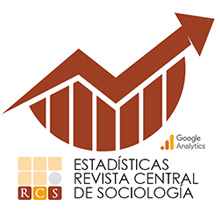Modalities of the political commitment of victims in Argentina
Keywords:
Activism, militancy, social mobilizationAbstract
This article analyzes the modalities of political commitment developed by different types of victims faced with the challenge of formulating public demands or claims. A comparative study of cases was carried out, based on the analysis of three sources: interviews with victims, texts with research results and a survey in the graphic press and information available on internet portals and social networks.
Based on this information, a processual study of some biographical trajectories was carried out to observe the various forms of engagement. On this basis we propose a typology of the different modalities of political commitment of the victims. This work makes it possible to account for the different ways in which subjects are linked to politics, beyond -or independently- of the inscription in a particular field and the temporality of their commitment.
In this way, the process of political commitment of the victims and family-victims will be analyzed, beyond the explanations that tend to emphasize the importance of the impact of the event as a break in the biography of the people, and mobilization way response to said rupture.
Downloads
Metrics
References
Agrikoliansky, E. (2017). Les ‘Carrières Militantesʼ. Portée et Limites d’un Concept narrative. En O. Fillieule, F. Haegel, C. Hamidi & V. Tiberj, (eds.) Sociologie Plurielle des Comportements Politiques (pp. 167-192). Paris: Presses de Sciences Politiques.
Armelino, M. (2005). La protesta sindical en la Argentina de los años noventa. VII Congreso Nacional de Ciencia Política, Sociedad Argentina de Análisis Político. Córdoba, Argentina,
Becker, H. (1960). Notes on the Concept of Commitment. The American Journal of Sociology, 66(1), pp. 32-40.
Barthe, Y. (2017). Les Retombées du Passé-Le Paradoxe de la Victime. Paris: Le Seuil.
Bennett, E.; Cordner, A.; Taylor Klein, P.; Stephanie Savell, S. y Baiocchi, G. (2013). Disavowing Politics: Civic Engagement in an Era of Political Skepticism. American Journal of Sociology, 119(2), pp. 518-548.
Downton, J. y Wehr, P. /1991). Peace Movements: the Role of Commitment in Sustaining Member Participation. Research in Social Movements, Conflicts and Change, 13, pp. 113-134. DOI: https://doi.org/10.1177/0022343398035005001
Fillieule, O. (2001). Propositions pour une Analyse Processuelle de l’engagement Individuel. Revue française de science politique, 51(1), pp. 199-215. DOI: https://doi.org/10.3917/rfsp.511.0199
Fillieule, O. y Mayer, N. (2001). Devenirs Militants. Revue française de science politique, 51(1), pp. 19-25.
Fillieule, O. y Neveu, E. (edt.). (2019). Activists Forever? Long-Term Impacts of Political Activism Floor. New York: Cambridge University Press.
Galar, S. (2015). Espacios Públicos Locales e Inseguridad: Reconfiguraciones a partir de Casos Conmocionantes en Capitales Provinciales (La Plata y Mendoza 2005-2013)”. Tesis de doctorado en Ciencias Sociales. Argentina: Universidad Nacional de La Plata.
Gatti, G. (2017). Un Mundo de Víctimas. Barcelona: Anthropos.
Gayol, S. y Kessler, G. 2018. Muertes que Importan: Una Mirada Sociohistórica sobre los Casos que Marcaron la Argentina Reciente. Buenos Aires: Siglo Veintiuno Editores.
Giordano, A.; Goñi, J.C.; Litvachky, P.; Morales, D.; Tordini, X.; Tufró, M y Vallarelli, F. (2021). Política y/o castigo. El corset de la vía penal. En AAVV. Post. Cómo luchamos (y a veces perdimos) por nuestros derechos en pandemia (pp. 143-146). Buenos Aires: Siglo XXI Editores y Centro de Estudios Legales y Sociales.
Jelin, E. (2005). Los Derechos Humanos entre el Estado y la Sociedad. En J. Suriano (dir). Nueva Historia Argentina, Tomo 10, Dictadura y Democracia (1976-1983) (pp. 507-557). Buenos Aires: Sudamericana.
Klandermans, B. (1997). The Social Psychology of Protest. Oxford: Blackwell.
Kriesi, H. (1996). The Organizational Structure of New Social Movements in a Political Context. En D. McAdam, J. McCarthy y M. Zald (eds.). Comparative Perspectives on Social Movements: Political Opportunities, Mobilizing Structures, and Cultural Framings (pp. 152-184). New York: Cambridge University Press.
Latté, S. (2012). La ‘force de l’événement’ est-elle un artefact ?: les mobilisations de victimes au prisme des théories événementielles de l’action collective. Revue Française de Science Politique, 62(3), pp. 409-432. DOI: https://doi.org/10.3917/rfsp.623.0409
Lefranc, S. y Mathieu, L. (2015). Mobilisations de Victimes. Rennes: PU Rennes.
Lichterman, P. (1996). The Search for Political Community: American Activists Reinventing Commitment. Cambridge: Cambridge University Press.
Lichterman, P. y Eliasoph, N. (2014). Civic Action. American Journal of Sociology, 120(3), pp. 798-863. DOI: https://doi.org/10.1086/679189
McAdam, D. (1982). Political Process and Development of Black Isurgency, 1930-1970. Chicago: The University Of Chicago Press.
McAdam, D. (1986). Recruitment to High-Risk Activism: The Case of Freedom Summer. American Journal of Sociology, 92(1), pp. 64-90.
McAdam, D. (1988). Freedom Summer. New York: Oxford University Press.
McAdam, D. y Paulsen, R. (1993). Specifying the Relationship Between Social ties and Activism. The American Journal of Sociology, 99(3), pp. 640-667.
McAdam, D.; McCarthy, J. y Zald, M. (1996). Introduction. En D. McAdam, J. McCarthy y M. Zald, (eds). Comparative Perspectives on Social Movements: Political Opportunities, Mobilizing Structures, and Cultural Framings (pp. 1-20), New York: Cambridge University Press.
McCarthy, J. y Zald, M. (1977). Resource Mobilization and Social Movements: A Partial Theory. American Journal of Sociology, 82(6), pp. 1212-1241.
Modonesi, M. (2016). El Principio Antagonista. Marxismo y Acción Política. México: UNAM-Ítaca.
Passy, F. (2002). Social Networks Matter. ButHow?. In M. Diani & D. McAdam, eds, The Social Movement and Networks: Relational Approach to Collective Action, New York: Oxford University Press, pp. 21-48.
Péchu, C. 2001. Les Générations Militantes à Droitaulogement. Revue Française de Science Politique, 51(1), pp. 73-103. DOI: https://doi.org/10.3917/rfsp.511.0073
Pereyra, S. (2005). “¿Cuál es el Legado del Movimiento de Derechos Humanos? El Problema de la Impunidad y los Reclamos de Justicia en los noventa”. En F. Schuster, F. Naishtat, N. Gabriel y S. Pereyra. Tomar la Palabra. Estudios sobre la Protesta Social y la Acción Colectiva en la Argentina (pp. 151-191), Buenos Aires: Prometeo.
Pita, M. V. (2010). Formas de Morir y Formas de Vivir: El Activismo Contra la Violencia Policial. Buenos Aires: Editores del Puerto.
Pita, M. V. y Autor1. (2020). Movilización de Víctimas y Demandas de Justicia en la Argentina Contemporánea. Buenos Aires: Teseo Press.
Piven, F. y Cloward, R. (1979). Poor People´S Moviments. Why They Succeed How they Sall. Nueva York: Vintage Book.
Sawicki, F. y Siméant, J. (2009). Décloisonner la Sociologie de L’engagement Militant. Note Critique sur Quelques Tendances Récentes des Travaux Français. Sociologie Du Travail, 51(1), 97-125. DOI: https://doi.org/10.1016/j.soctra.2008.12.006
Snow, D.; Rochfold, B.; Worder, S. y Benford, R. (1986). Frame Alignment Processes, Micromobilization, and Movement Participation. American Sociological Review, 51(4), pp. 464-481. DOI: https://doi.org/10.2307/2095581
Snow, D.; Cress, D.; Downey, L. y y Jones, A. (1998). Disrupting the “Quotidian: Reconceptualizing the Relationship Between Breakdown and the Emergence of Collective Action. Mobilization: An International Quarterly, 3(1), pp. 1-22. DOI: https://doi.org/10.17813/maiq.3.1.n41nv8m267572r30
Tarrow, S. (1997). El Poder en Movimiento. Los movimientos sociales. La acción colectiva y la política. Madrid: Alianza Editorial.
Van Deth, J. W. (2006). Democracy and involvement: the benevolent aspects of social participation. En M. Torcal y J. Ramón Montero (coord). Political disaffection in contemporary democracies: social capital, institutions and politics (pp. 101-129). New York: Routledge.
Waisbord, S. R. (2004). Scandals, media, and citizenship in contemporary Argentina. American Behavioral Scientist, 47(8), pp. 1072-1098. DOI: https://doi.org/10.1177/0002764203262278
Zenobi, D. (2014). Familia, Política y Emociones. Buenos Aires: Antropofagia.
Clarín (2013a). “Las mamparas en los bancos, un legado del caso Píparo”, 13 de mayo. Disponible en https://www.clarin.com/policiales/mamparas-bancos-legado-caso-piparo_0_ByoHzBusvmg.html (consulta: 03 de mayo de 2021).
Clarín (2013b). “Cinco perpetuas por la salidera a Carolina Píparo”, 14 de mayo. Disponible en https://www.clarin.com/inseguridad/perpetuas-salidera-Carolina-Piparo_0_ByZ4zHujwmx.html (consulta: 03 de mayo de 2021).
Conclusión (2016). “Alberto Perassi, tras el fallo: “Hoy nos han dado un poco de justicia”, 9 de mayo. Disponible en https://redaccion.conclusion.com.ar/policiales/alberto-perassi-hablo-tras-el-fallo-hoy-nos-han-dado-un-poco-de-justicia/05/2016/ (consulta: 03 de mayo de 2021).
Conclusión (2017). “Han manoseado tanto a nuestra familia que a veces es difícil soportarlo”, 19 de septiembre. Disponible en https://www.conclusion.com.ar/policiales/judiciales/alberto-perassi-han-manoseado-tanto-a-nuestra-familia-que-a-veces-es-dificil-soportarlo/09/2017/ (consulta: 03 de mayo de 2021).
Revista Cabal (2015). “Sergio Levin: militante de la vida”, febrero. Disponible en https://www.revistacabal.coop/actualidad/sergio-levin-militante-de-la-vida (consulta: 03 de mayo de 2021).
Blanco, Patricia (2020). “A 14 años de la tragedia del colegio Ecos, condenaron por homicidio al chofer del micro que llevaba a los estudiantes”, Infobae, 8 de octubre. Disponible en https://www.infobae.com/sociedad/2020/10/08/a-14-anos-de-la-tragedia-del-colegio-ecos-condenaron-por-homicidio-al-chofer-del-micro-que-llevaba-a-los-estudiantes (consulta: 03 de mayo de 2021).
Published
How to Cite
Issue
Section
License
Copyright (c) 2022 Adrián Pablo Berardi Sparani, Sebastián Pereyra

This work is licensed under a Creative Commons Attribution-NonCommercial-ShareAlike 4.0 International License.

















